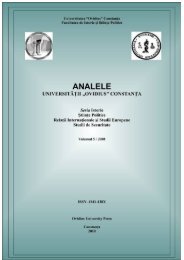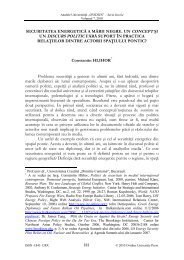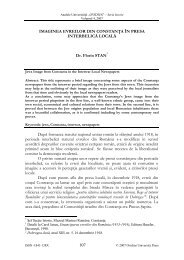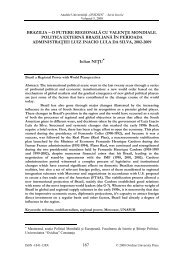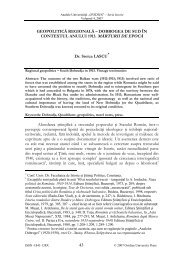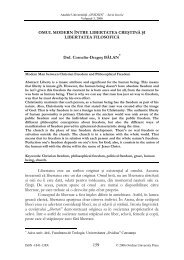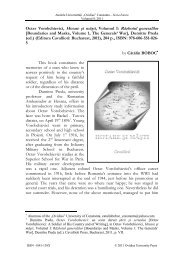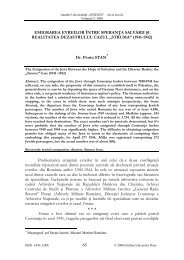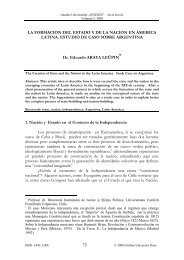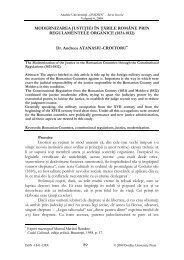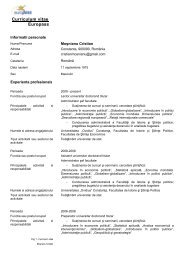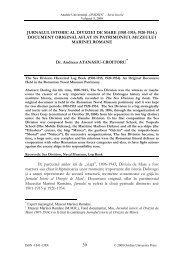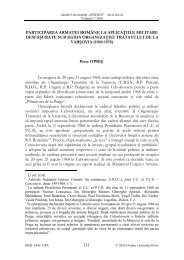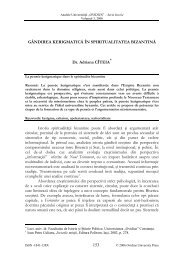analele universitÄÅ£ii âovidiusâ constanÅ£a - AUOCSI
analele universitÄÅ£ii âovidiusâ constanÅ£a - AUOCSI
analele universitÄÅ£ii âovidiusâ constanÅ£a - AUOCSI
Create successful ePaper yourself
Turn your PDF publications into a flip-book with our unique Google optimized e-Paper software.
Analele Universităţii „OVIDIUS” – Seria Istorie<br />
Volumul 6, 2009<br />
ELITELE POLITICE ŞI „EXCEPŢIONALISMUL” POSTMODERN<br />
AL DEMOCRAŢIEI ROMÂNEŞTI<br />
Dr. Viorella MANOLACHE <br />
Political Elites and the Post-modern Romanian Democracy „Exceptionalism”<br />
Abstract. The ticket promised for a “new setting”, that of the European community,<br />
testifies for the governing of the Romanian action and thought by what Lyotard<br />
considered to be “the idea of humanity’s emancipation”. Out of this promise there<br />
spread out various Romanian political platforms, oscillating between political and<br />
economic liberalism, Marxist-“ism”, and radicalism, among others. The Romanian<br />
political class engages itself in launching discourses (electoral, parliamentary etc) after<br />
this “rhetoric of emancipation”. J.-F. Lyotard warned that it was not the absence of<br />
progress, but, on the contrary, the technical, scientific, artistic, economic and political<br />
development that made possible the “total wars”, the totalitarianism, the growing<br />
discrepancy between the richness of the West and the poverty of the East,<br />
unemployment and the “new poverty”, and the “general lack of education”. These<br />
entire inconvenient (social, political, economic etc.) insert “secret obstacles” in the way<br />
of the “silent perpetuation” of the modern project.<br />
Keywords: elites, post-modernism, political class, democracy, Romania<br />
1. Globalizare şi postmodernism: “evaluări slabe” ale elitei politice româneşti<br />
Este unanim acceptat faptul că, modernitatea românească ar parcurge un<br />
proces de extincţie odată cu afişarea pronunţată a caracterului ideologic al<br />
reperelor istorice. Ipoteza potrivit căreia, ideea de istorie ca realizare progresivă a<br />
umanităţii, ca proces unitar, se recunoaşte într-o serie de intervenţii româneşti,<br />
postdecembriste, grupate în numărul 1-4, tom 2/1994-”Postmodernism,<br />
postcomunism, postistorie”, editat de Xenopoliana, buletinul Fundaţiei Academice<br />
„A. D. Xenopol”, din Iaşi.<br />
Convingerea istoricului Al. Zub este că, în Europa de Est,<br />
postmodernitatea „coincide cu post-totalitarismul”, cu menţiunea că o definire<br />
limitată a termenului, mai exact a sensului, nu s-a localizat, încă, în discursul<br />
istoric şi politic, actual.<br />
Al. Zub preia reperele cu care operează postmoderniştii occidentali şi<br />
apreciază că, se poate vorbi şi în cazul românesc de o „criză a modelului<br />
epistemic”. Raportul dintre zonele centrale şi periferie, dintre civilizaţie<br />
occidentală şi primitivism („barbarie orientală” în termenii lui Titu Maiorescu)<br />
este, unul recesiv, acesta presupunând nu atât o relaţie concurenţială, cât una<br />
Asistent de cercetare Institutul de Ştiinţe Politice şi Relaţii Internaţionale al Academiei<br />
Române.<br />
ISSN -1841-138X 133 © 2009 Ovidius University Press



